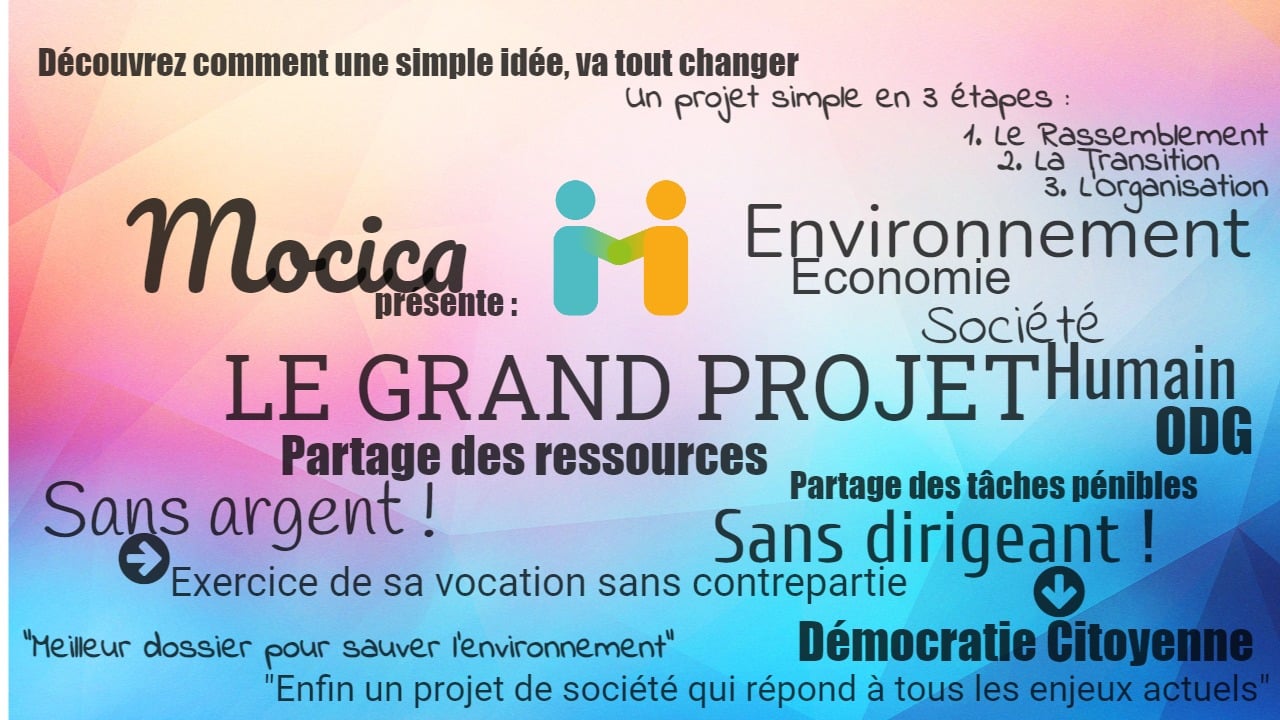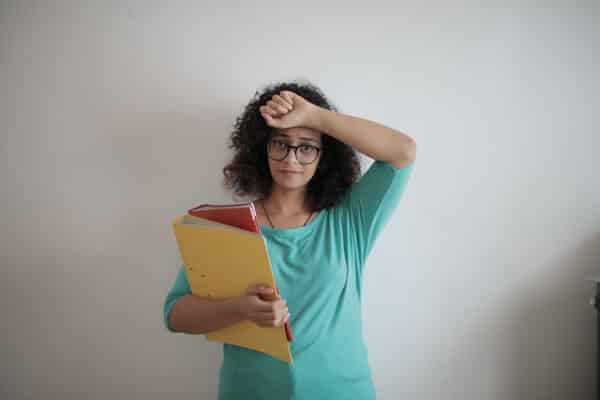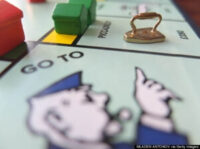Changing the World: The Great Project.
The Grand Project proposes a society model that would solve most of today’s problems by eliminating money.
Money is the cause of too many abuses (see Findings). And whether they are ecological, economic, social or human, they are no longer acceptable. This is why the MOCICA Great Project proposes to move to a better world, without money. Find out more about the Major Project below…
The Great Project, in brief :
First, here are the key points that support the idea that a cashless organisation can save the world. Indeed, these form the basis of the Great Project. They relate to the areas: Environment / Economy / Politics / Social / Human. Finally, you will find many answers to your questions in: F.A.Q. and more information on these subjects in: Files
Économy :
Firstly, an economic system without money protects against financial crises, bankruptcy, redundancies, etc.
In addition, it would enable qualitative, sustainable productivity and free us from a huge workload.
Furthermore, moving away from competitiveness and compulsory profit will facilitate flexibility, automation and collaboration.
Finally, without financial restraint, the organisation will be freer, more fluid and efficient.
Environment :
First of all, environmental solutions exist. On the other hand, the mechanisms of the financial system slow down or even prevent their development.
Yet in a world without money, we will be able to reduce human activity freely, without economic repercussions.
Thus, the end of money would allow for a large-scale societal change, as the climate emergency requires.
Politics :
Organisational systems such as the sociocracy show that an organisation like the GDO is fully capable of managing the whole company.
Social :
A world without money allows for a harmonious, balanced, cohesive and collaborative society. In addition, it does not give rise to scams, mafia trafficking or harmful markets.
Human :
Humans are social beings. It has a strong tendency to react to its environment, and is conditioned by reflex mechanisms to stimuli (Behaviorism and Cognitivism ).
Dans un monde sans argent, il serait soulagé des nombreux troubles accompagnant l’usage de l’argent. (Voir “Dossiers”, partie “Sciences”)
The Great Project or how to make society evolve.
A world without money :The Great Project.
Above all, being useful to others is considered a basic need (Abraham Maslow, Virginia Henderson, etc.). In fact, we have always sought to organise ourselves because we are interdependent and must meet our needs. Moreover, in a world where money does not exist, it is no longer possible to payto get something. This is why it is in everyone’s interest to participate in society on an equal level with others (according to their physical and intellectual abilities)
How does the work in the Great Project work?
Tout d’abord, sans argent, nous n’avons plus à nous battre contre la concurrence pour attirer le client. Then each sector(food, health, research, etc.) can cooperate to ensure its role for the others. De plus, pas d’obsolescence programmée, pas d’incitation à la consommation, pas de licenciements, pas de crises financières, etc.
Similarly, by contributing freely to society, we would all get a delayed, multiplied and generalised return in return.
In this way, we will no longer work for a salary, but with awareness we could all be be actors in society, which in return offers us what we need.
Choosing your activity for greater efficiency:
Only the freedom to choose one’s sector of activity allows one to exercise one’s vocation, to free one’s creativity. But also to be in control of one’s working conditions, to move forward in cooperation and not in hierarchy. Moreover, choosing one’s activity allows one to obtain full personal satisfaction and to evolve in a general understanding.
Moreover, if certain tasks do not create enthusiasm, we will be able to improve the conditions, without budgetary and human restrictions as at present. From comfort to timetables, through automation and distribution by a huge workforce, our human and technical potential should be able to respond with general satisfaction.
Finally, if a place of production is too far away from the demand, its relocation should happen naturally when it is no longer motivated by cheap labour.
The Great Project to create a better world.
The four principles of the Great Project :
The Great Project and the economy.
The economic benefits of the Great Project.
To begin with, the inventory of resources will allow for equitable distribution and fair use in respect of our ecosystem. In order not to take more than the planet can produce, and to avoid waste.
Secondly, information technology will make it easy to manage the resources and needs of each community, region and nation. The same applies to the distribution of joint activity for a more qualitative world as well as quantitative.
Moreover, without money, there is no commercial competition. Thus, those who share the same sector of activity are free to cooperate. The end of competition will allow the organisation, collaboration and evolution of each sector of activity.
In addition, one of the biggest economic benefits is likely to be the end of waste. Indeed, with the end of the mass overconsumption generated by the market system, there will be a very significant decrease in the consumption of resources.
On the other hand, the end of programmed obsolescence will generate much less waste. And the design of objects will be rethought so that they are recyclable, adaptable or long-lived.
Finally, the sharing of resources will ensure overall balance and equity.
Examples are given in a table.
The changes of a world without money in economic terms :
| With money | Without money |
|---|---|
| Mass over-consumption to maintain the current system. | Stop wasting resources. |
| Competition. | Cooperation. |
| Access to goods and services for those who can afford them. | For all, access to the most necessary, useful, ecological or fair. |
| Wealth concentration. | Resource sharing. |
| Limited research and development. | Free and shared research and development. |
| Knowledge retention (patenting). | Sharing knowledge. |
| Sharing knowledge. | Adapted productivity. |
| Administrative, financial and commercial pressure. | Sans lourdeur administrative, financière et commerciale. |
| Power of money. | Equity |
| Jobs’ Constraints. | Job’s Choice. |
| Unemployment/Layoff. | Stable job. |
| Hard working conditions. | Improved work conditions. |
| Food waste. | Food autonomy. |
| Administrative and financial complexity. | Smooth and optimised organisation. |
| Mafia trafficking/Corruption. | End of trafficking and corruption. |
Non-exhaustive list …
In economic terms:
| With money |
Without money |
|---|---|
| Mass Consumption for maintaining the current system |
Stopping the waste of resources |
| Concurrence | Co-operation |
| Access to property and services to those who have the means |
Access to the most necessary, useful, ecological or fair |
| Concentration of wealth |
Sharing of resources |
| Research and development restricted |
Research and development freed and mutualised |
| Retention of knowledge (patent registrations) |
Sharing knowledge |
| Productivity growing |
Productivity adapted |
| Administrative pressure financial and commercial |
Without being heavy pressure financial and commercial |
| Power of money |
Equity |
| Constraint of job |
Choice of job |
| Unemployment Dismissal |
Stable job |
| Hard Work conditions |
Hard Work conditions enhanced |
| Waste food |
Autonomy food |
| Administrative Complexity and financial services |
Fluid Organisation and optimized |
| Mafia trafficking Corruption |
End of trafficking and of bribery |
Non-exhaustive list…
The environment in the Great Project.
The Big Project: The environmental benefits of a world without money.
Firstly, moving to a society without money leads to a radical decreasein pollution and resource depletion.
Indeed, among other factors, we can note:
– Firstly, the end of financial activities (premises, energy, supplies, IT flows, etc.)
– Secondly, relocation
– Thirdly, the end of over-consumption mechanisms (programmed obsolescence, advertising, etc.)
Now, these factors are allparametersthat have astrong climate impact.
In addition, research centres, freed from money, will be able to pool knowledge. As a result, all sectors will be able to develop significantly.
Finally, they will be able to design objects that are recyclable and/or have a lifespan that has never been achieved before. Not to mention that everything will be distributed in short circuits.
The environmental changes of a world without money:
| With money | Without money |
|---|---|
| Environmentally destructive activities. | Environmental remedial activities. |
| High and constant human activity based on profit. | Moderate human activity adapted to the needs of the moment. |
| Scheduled obsolescence. | Recyclable and long lasting. |
| Relocations. | Short circuits. |
| Environmental cost of financial activity (bank buildings, insurance, speculation, financial flows…). | Environmental economy related to the shutdown of the financial and banking sectors, and part of the advertising sector. |
| Increasing pollution. | Decreasing pollution. |
| Resource plundering. | Preservation of remaining resources and replenishment of renewables. |
| Climate disruption. | Climate improvement. |
| Incentives for consumption (advertising, etc.). | Encouraging moderation. |
| Poaching, animal abuse. | Stop illegal markets and animal profitability. |
Non-exhaustive list…
On the environmental side :
|
With money |
Without money |
|---|---|
| Activities destructive to the environment |
Activities repairing the environment |
| Activity Activity high and steady, profit-based |
Activity Activity moderate and adapted to the current needs |
| Planned obsolescence |
Recyclable and long lifetime |
| Outsourcing | Short circuits |
| Environmental cost related to the financial activity (buildings of banks, insurance, speculation, financial flows…) |
Économy environmental related to the cessation of financial, banking and insurance sectors advertising |
| Increasing pollution | Decreasing pollution |
| Resource plundering | Preservation of remaining resources and reconstitution of renewables |
| Climate improvement |
Climate improvement |
| Incentive for consumption (advertisement, etc.) |
Incentive for moderation |
| Poaching, animal animal |
stopping illegal markets and profitability animal |
Non exhaustive list…
The Great Project and politics.
The political benefits of the Great Project :
Le Grand Projet propose l’ODG : Organisation Démocratique Globale.
En premier lieu, elle s’organise suivant 5 niveaux de prise de décision (Quartier, Ville/Village, Zone de ressources, Culture/Nation, Monde).
Ensuite, cette organisation permet à chacun de prendre part aux décisions qui le concernent.
Enfin, elle permet de mettre en place les accords de communauté (ou règlements intérieurs) sans l’intermédiaire de dirigeants.
Social relations in the Great Project.
The social benefits of the Major Project :
To begin with, in a society without money, we are free to organise ourselves in cooperation.
Moreover, world hunger could be eradicated quickly and without major difficulties. We will also see the end of many of the deviant behaviours of today’s society (scams, wars motivated by power and financial issues would end).
In addition, we would no longer have to fight to attract customers and beat the competition.
Finally, the increasingly burdensome “every man for himself” approach would give way to a group organisation.
So it would be much more conducive to collaboration and teamwork.
The social changes of a world without money :
| With money | Without money |
|---|---|
| Social inequalities. | Social Balance. |
| Hunger in the world. | Food self-sufficiency for all. |
| Competition. | Cooperation. |
| Empty homes and homelessness. | Occupation of all housing. |
| Significant radical shifts. | Low radical drift. |
| Monetary slavery. | Free from monetary constraints. |
| Non-coherent society. | Coherent society. |
| Each one for himself. | Collaboration / Cooperation. |
Non-exhaustive list…
On the social level :
|
With money |
Without money |
|---|---|
| Social inequalities | Social balance |
| Hunger in the world |
Autonomy food for all the world |
| Concurrence | Co-operation |
| Empty houses and homeless |
Occupancy of all housings |
| Radical drifts severes |
Low drifts radical |
| Slavery monetary |
Freed from monetary constraints |
| Non coherent society |
Coherent Society |
| Each to his own | Collaboration Co-operation |
Non exhaustive list…
The Great Project and the human being.
The human benefits of the Great Project :
In this new system, the individual will be free to invest in the field(s) of his/her choice. In this way, they will be able to contribute, with pleasure and efficiency, to the collective that provides for all their needs.
In addition, it would be free of stress, hierarchical pressure and numbers. Therefore, the choice of activity is the ground for being creative and qualitative.
On the other hand, the purpose of the education system will have several objectives. This includes improving mutual aid, sharing, cooperation and collective intelligence.
Finally, freeing ourselves from money will allow certain current behaviours (egocentrism, individualism, competition) to evolve towards behaviours adaptedto thisnew society.
The changes of a world without money in human terms:
| With money | Without money |
|---|---|
| Distrust. | More confidence. |
| Sense of ‘I’. | Sense of ‘We’. |
| Inequalities. | Equalities. |
| Individualistic mindset. | Team mindset |
| Teaching for those who financially, and in a spirit of competition |
Education for all, in a positive and collaborative spirit |
| Work choice constraint. | Free choice of activity. |
| A feeling of “we are walking on our heads”. | Coherence feeling |
Non-exhaustive list…
On the human level :
|
With money |
Without money |
|---|---|
| Distrust | More of trust |
| Feeling of « I » |
Feeling of « we » |
| Inequalities | Équalities |
| Individualistic mindset | Team mindset |
| Teaching reserved for those who can afford it and in a spirit of competition |
Teaching for all, in a positive spirit of collaboration |
| Constraint of work choice |
Free choice of its business |
| A feeling of « we walk on the head » |
A feeling of coherence |
Non exhaustive list…
The Great Project steps
Step 1 of the Grand Project: The Gathering.
Tout d’abord, vous pourrez choisir de soutenir l’idée de ce nouveau système en adhérant au Grand Projet. Ensuite, vous pouvez devenir acteur de ce changement. Dans ce cas, vous participez avec les autres citoyens à la mise en place de cette nouvelle société. D’ailleurs, n’hésitez pas à rejoindre votre assemblée la plus proche sur l’application (réservé aux adhérents).
Deuxièmement, l’objectif de cette étape est de fédérer et de se retrouver toujours plus nombreux dans des assemblées locales. A propos, les assemblées peuvent être citoyennes ou thématiques lorsqu’elles représentent une entreprise ou un secteur d’activité (agriculture, enseignement, santé, recherche etc.).
En somme, les objectifs des assemblées sont :
- Premièrement, développer l’entente et la coordination locale, nécessaire à notre gestion et autonomie future.
- Ensuite structurer progressivement le Grand Projet.
- Enfin, prendre part au changement en faisant connaître le Grand Projet à son entourage.
En effet, présenter et discuter de cette nouvelle société avec son réseau est essentiel. C’est pour cela qu’il est important de répondre aux objections. En effet, concevoir un monde sans argent est difficile à la 1ère discussion. En revanche, il est important de ne pas imposer son choix à son interlocuteur. Enfin, il faut rendre viral le sujet car la situation nécessite un grand changement.
De surcroît, toutes les actions vers l’autonomie et la gratuité sont les bienvenues. Par contre, il sera probablement difficile de créer le changement avant de sortir de ce système. A cause de notre actuel manque de temps, d’énergie, de moyens, et tout simplement de liberté. Ce qui est d’autant plus le cas dans des pays pauvres ou particulièrement asservis.
Enfin, nous ne devrons pas réorganiser la société pour sortir du système, mais bien sortir du système pour la réorganiser.
Step 2 of the Great Project: Organisation.
Then, with the massive gathering and the structured GDO, we can decide together on our future organisation. In addition, we will be able to anticipate the exit from the monetarysystem.
Finally, we will be able to decide togetheron the right momentfor the transition, which could take place simultaneously at global level after a referendum.
Depending on the development of the project and the global situation, it is conceivable that this could start at a sufficiently large geographical level, such as a continent.
Stage 3 of the Great Project: Transition.
Firstly, this stage is likely to be short, of the order of a few days to a few weeks. In addition, it may be optional depending on what has been decided in the preparation phase.
On the other hand, on the day, we propose to everyone to continue their usual activitywithout using any money and without any compensation.
- This will first of all allow us, without any particular effort or violence, to free ourselves from this system. But still, to keep our usual benchmarks, while maintaining the necessary functioning to start.
- In addition, all financial and related activities (banks, insurance, etc.) may cease and join other sectors.
- In addition, the financial crisis will be over, our debts will be gone, corruption impossible, etc.
- As for the GDO, it will then be structured and in place.
- Finally, we will be able to act without the constraints of the system and reorganise ourselves in the ways chosen in step 2.
For example, professionals in finance and administrative activities can support other sectors or set up new networks. Afterwards, empty housing can be opened up to the homeless, etc.
The Great Project: Details.
A universal and fair proposal:
The Great Project is a pacifist action whose universal proposal is fairto every citizen of the world.
Secondly, it depends solelyon the humanity’s choice and not on the will of its leaders.
Moreover, the Great Project does not require any structural prerequisites or financial costs.
Finally, it enables a rapid and adequate response in the event of an economic collapse.
On the other hand, MOCICA’s Great Project may seem vague and involve a great deal of uncertainty. Indeed, it is. Since the unknown is invariably linked to the paradigm shift. Indeed, we cannot demand the latter without diving into the former.
Moreover, we cannot, on the one hand, propose a system where human potential can express itself freely, and on the other hand impose a precise and formal framework.
On the other hand, it is nevertheless possible to establishthe lines and principles necessary for genuine logistics.
It is also about building a new model that brings freedom, security, equity and environmental protection.
This is indeed what we modestly hope to answer here.
You can change the world.
In conclusion, there is always time to change direction. Indeed, every crisis is an opportunity to change course. Finally, we have unprecedented technological and intellectual capacity. In this way, we can rebalance the situation, through a model of living in harmony with the planet and the available resources.
MOCICA Team.
How can we be sure that the Grand Projet is the right way?
Let’s take the example of two of the major challenges facing humanity:









